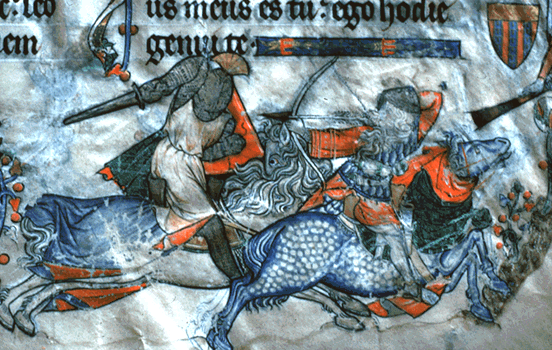 The noble and gallant King of
Bohemia, also known as John of Luxembourg because he was the son of the emperor Henry of
Luxembourg, was told by his people that the battle had begun. Although he was in
full armor and equipped for combat, he could see nothing because he was blind. He
asked his knights what the situation was and they described the rout of the Genoese and
the confusion which followed King Phillip's order to kill them. "Ha,"
replied the King of Bohemia, "That is a signal for us." .
. . Then the King said a very brave thing to his knights: "My
Lords, you are my men, my friends and my companions-in-arms. Today I have a
special request to make of you. Take me far enough forward for me to strike a blow
with my sword." Because they cherished his honor and their own prowess, his
knights consented. . . . In order to acquit themselves well and
not lose the king in the press, they tied all their horses together by the bridles, set
their king in front so that he might fulfil his wish and rode towards the enemy.
The noble and gallant King of
Bohemia, also known as John of Luxembourg because he was the son of the emperor Henry of
Luxembourg, was told by his people that the battle had begun. Although he was in
full armor and equipped for combat, he could see nothing because he was blind. He
asked his knights what the situation was and they described the rout of the Genoese and
the confusion which followed King Phillip's order to kill them. "Ha,"
replied the King of Bohemia, "That is a signal for us." .
. . Then the King said a very brave thing to his knights: "My
Lords, you are my men, my friends and my companions-in-arms. Today I have a
special request to make of you. Take me far enough forward for me to strike a blow
with my sword." Because they cherished his honor and their own prowess, his
knights consented. . . . In order to acquit themselves well and
not lose the king in the press, they tied all their horses together by the bridles, set
their king in front so that he might fulfil his wish and rode towards the enemy.
The good king . . . came so close to the
enemy that he was able to use his sword several times and fought most bravely, as did the
knights with him. They advanced so far forward that they all remained on the field,
not one escaping alive. They were found the next day lying around their leader, with
their horses still fastened together.
Jean Froissart, Chronicles (Penguin Books), translated by Geoffrey Brereton
 The noble and gallant King of
Bohemia, also known as John of Luxembourg because he was the son of the emperor Henry of
Luxembourg, was told by his people that the battle had begun. Although he was in
full armor and equipped for combat, he could see nothing because he was blind. He
asked his knights what the situation was and they described the rout of the Genoese and
the confusion which followed King Phillip's order to kill them. "Ha,"
replied the King of Bohemia, "That is a signal for us." .
. . Then the King said a very brave thing to his knights: "My
Lords, you are my men, my friends and my companions-in-arms. Today I have a
special request to make of you. Take me far enough forward for me to strike a blow
with my sword." Because they cherished his honor and their own prowess, his
knights consented. . . . In order to acquit themselves well and
not lose the king in the press, they tied all their horses together by the bridles, set
their king in front so that he might fulfil his wish and rode towards the enemy.
The noble and gallant King of
Bohemia, also known as John of Luxembourg because he was the son of the emperor Henry of
Luxembourg, was told by his people that the battle had begun. Although he was in
full armor and equipped for combat, he could see nothing because he was blind. He
asked his knights what the situation was and they described the rout of the Genoese and
the confusion which followed King Phillip's order to kill them. "Ha,"
replied the King of Bohemia, "That is a signal for us." .
. . Then the King said a very brave thing to his knights: "My
Lords, you are my men, my friends and my companions-in-arms. Today I have a
special request to make of you. Take me far enough forward for me to strike a blow
with my sword." Because they cherished his honor and their own prowess, his
knights consented. . . . In order to acquit themselves well and
not lose the king in the press, they tied all their horses together by the bridles, set
their king in front so that he might fulfil his wish and rode towards the enemy.